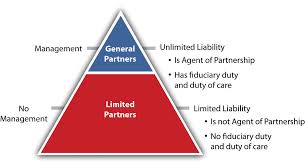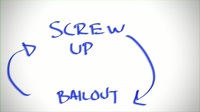My Uncle Sam’s Solution To The Moral Hazard Problem
What is moral hazard?
 Let’s say that you have a gambling problem. You like to bet on football, baseball, basketball, and hockey. Professional, college, or high school — it doesn’t matter. You visit your local casino to bet on cards. You bet on the coin flip at the start of a football game. You will bet on anything.
Let’s say that you have a gambling problem. You like to bet on football, baseball, basketball, and hockey. Professional, college, or high school — it doesn’t matter. You visit your local casino to bet on cards. You bet on the coin flip at the start of a football game. You will bet on anything.
Now generally people like this will end up in trouble at some point or another if they cannot control their vice. I have seen friends of mine get into this sort of trouble. It isn’t pretty. At some point they hit a losing streak and end up owing a “bookie”, more than they have. At some point after this happens, their debts get called. If the debt is called and you don’t have the money, “something bad” will happen.
However, lucky for you, your Uncle Samuel is wealthy. When you get into trouble, you call Uncle Samuel to “bail” you out of this mess. Being a loving uncle, he gives you money to keep you from being the victim of “something bad”. Now maybe this scares you straight and you give up your gambling vice and you never gamble again. More likely than not, this “bail out” will only fuel your appetite for gambling (risk taking). Since you didn’t have to experience the pain of “something bad”, you will feel free to engage in the same destructive behavior as before. This time you might take greater risks with your bets. Why not? Your wealthy Uncle Samuel can come to your aid, and he has a lot more money than you do. So the pattern continues.
As your behavior continues, the pattern repeats itself. As you continue to get bailed out, your appetite for risk increases. This is an example of moral hazard. Moral hazard is a lack of incentive to protect against risks because someone else is bearing the risk for you. The best example of moral hazard is the treatment of large financial institutions in 2008 by the US government and related government entities.
The US government bailouts of 2008
Back in 2008, the global financial markets experienced a meltdown which was life changing for many people. While there is no one single factor that caused the financial destruction that happened during that 2nd and 3rd quarter of 2008, one of the largest factors is Moral Hazard.
“I have seen old traders and I have seen bold traders. I have not seen any old, bold traders.” – Wall Street saying, author unknown
The 2008 financial crisis caused chaos across the globe in financial markets everywhere. The US government, the US Treasury, and the Federal Reserve all worked together to keep the economy working in this time of crisis. However what they also did was enforce the understanding that large firms are not allowed to fail. They were too important in the eyes of the government.
This quiet understanding between the large financial firms and the US government has caused financial firms to grow even larger and become even more important to fail. While the size of these financial firms is not ideal, that in itself is not what causes the problems. The problems are caused because of the highly risky leveraged trading that these “too big to fail” firms are engaging in. If these firms are limited due to their “importance” in the US financial system, this will mitigate the majority of the problems inherent in being “too big to fail”
A brief history of Wall Street
Moral hazard causes financial crisis
Prior to the 1960s, Wall Street banks and financial service companies were almost entirely set up as private partnerships. Essentially what this means is that the firm makes money on an annual basis from providing services to its clients, then the partnership pays out the profits to the partners. While this type of partnership can provide some significant monetary benefit for the partners, it also provides unlimited liability to the partners individually. This means that if the partnership loses money, they might be required to pay their personal funds into the partnership to cover the loss, or if the losses are big enough, the partners could get wiped out financially.
This type of partnership set up was a powerful way for firms to create an incentive structure that properly balanced both the risk and reward of the capital investments. This type of setup had worked for decades. If a firm didn’t make prudent decisions, they would go bankrupt. This is how capitalism is supposed to work. People and firms who make prudent decisions, survive, and ones who do not, don’t.
All was right in the world until the 1950-1960s. This is when financial firms started to incorporate. Many of these firms grew from a small size to a much larger one with a lot more partners. The older, wiser, and more conservative managers overseeing the firm’s risk were eventually replaced by younger more aggressive traders seeking to personally make very large amounts of money quickly. Many of these firms began to consolidate and merge and become public companies by filing for an IPO.
Once these firms became incorporated publicly traded companies, they started using high amounts of leverage. Just prior to the financial crisis of 2008 some firms had as much as 33:1 leverage on the firm’s assets.1 I even heard rumors of some firms being as high as 50:1 or more. To put those numbers in perspective, if you have a $100,000 in your brokerage account and use 33:1 leverage to buy a stock, and then that stock price drops more than 3%, your brokerage account will be wiped out. There is very little room for error with that amount of leverage. Leverage is a double-edged sword. It amplifies your performance positively and negatively.
Human Nature is not a problem that can be fixed by rules and regulations. All solutions to the existing problems must be based on how people behave, not on how we think they should behave.
Human nature is a constant. While every person is different, you should expect that people will act in their own best interests as they perceive them.
The story of the frog and the scorpion
Human nature cannot be changed
A scorpion and a frog are on one side of a river. The scorpion asks the frog to carry him over to the other side of the river. The frog initially says no. He says to the scorpion I will not allow you to ride on my back because you will sting me. The scorpion argues that he will not, and that if he stings the frog they will both drown. It makes no sense for me to sting you. The frog finally agrees to carry the scorpion on his back to the other side of the river. As the frog in swimming about midway across the river, the scorpion does indeed sting the frog, dooming them both. The frog asks why he stung him. The scorpion replies, because it is in my nature. I am a scorpion. – Unknown
I have always loved this story because it points out that people will always act in their own self-interest as they perceive them. Now take some of the people who worked on Wall Street and were instrumental in the crisis of 2008. They were trying to maximize profits and make as much revenues for their firms as they could. Just like the scorpion, I cannot blame them because it is their job to do so. You should expect that Wall Street will always try to maximize profit whenever it can get away with it, and when the perceived risks are small compared to a much larger reward.
The problem is not in human nature, that is unfixable. The problem is in the lack of proper rules and the lack of proper enforcement of the rules. For example, how many people have gone to jail over the 2008 global financial crisis? How many firms should have gone into bankruptcy, but didn’t? How many companies were saved because the rules were changed to suit them? I could go on, but you get the picture. If this behavior is allowed to continue without consequence, then the behavior will continue.
I don’t know of anyone who has gone to jail for many of the highly publicized issues. If you can find one, I would like to know. Feel free to contact me.
Just in case you think I’m being naïve…
- How many people or companies have been prosecuted and or convicted under Sarbanes Oxley?
- How many people have been fined for violating the Do Not Call list laws?
- How many people have gone to jail for manipulating the LIBOR rates?
- How many people have gone to jail for “cornering” the various commodity markets in the past 30 years?
In case you are wondering, the answer to all of these is ZERO.
I could go on, but I think you get the picture.
A lot of the blame lays on the shoulders of the regulators, but it is not entirely their fault. In many cases they are ill-equipped to handle these types of cases. They take direction other people too. The system is not currently designed to properly regulate the financial markets in a way that can eliminate or even minimize moral hazard. It is a structural issue. Structural issues requires people to move mountains to fix. Given our existing political system, it is unreasonable to expect this to be truly fixed.
The best way to fix a system that is structurally broken is to find one or two things that have the greatest impact and can inherently force changes based on human nature. These changes cannot be draconian and attempt to alter their human nature, rather the solution must be simple enough to be implemented without immediate harm to the affected companies. In the case of banks or financial service companies, I have found one simple way to align human nature with realistic incentives that do not cause harm to the people on wall street running these large firms.
Here are the benefits:
- This change does not negatively affect the profits of Wall Street firms.
- Wall Street firms should have no rational objection to this solution.
- This change will allow wall street firms to take as much risk as they want in their investment/trading activities.
- This solution will relieve the financial industry regulators of attempting to measure the extremely complex risk at these financial firms.
- This solution will reduce the large burden put on the regulators to regulate these firms. Wall Street firms will effectively police themselves.
- This solution has worked in the past, there is no reason it would not work now.
- The US taxpayer does not have to worry about paying the bill for any more failed financial institutions.
- The politicians don’t have to worry about continually getting egg on their face because they supported the latest financial bailout.
- The politicians can finally agree upon something. Both parties can agree on passing this law, since it does not “harm” any of their supporters or constituents.
- The Glass-Steagall Act (before it was dismantled) worked in the same way that this solution does. It takes human nature and forces it to work within a system that causes companies to police themselves.
The solution is simple.

The solution to moral hazard has other benefits too.
The solution is simple. In order for the financial firms to balance their desire for reward with human nature, which is immovable, all of these firms need to be structured as general partnerships.
A general partnership is a legal entity where the profits and losses are disbursed to the partners. Losses that exceed what is available at the partnership would be borne by the general partners and they would be required to contribute the amount of the losses back into the partnership.
This would fix the risk-reward balance to what is acceptable at these firms given the very REAL risk of personally being liable for the risks they are taking. If someone at one of these firms knows they could be personally wiped out in the financial sense, they would be more reluctant to engage in highly risky activities.
Wall street companies, which are incorporated, have a maximum risk of loss threshold for employees at — losing their job. This is hardly a deterrent. On one side you have the ability to make tens of millions of dollars for taking large highly risky leveraged bets. On the other side you could lose your job. If I was at the casino making a bet like this, I would take this bet every day of the week. I don’t know too many people who would disagree with that statement. The risk of loss is asymmetric to the reward of profits.
This does not need to apply to all financial firms, just ones that use leverage, take customer money (i.e. a bank) and use that money to earn their revenues, are large enough where their failure could affect the entire financial system, or have access to money via the government directly or indirectly where a loss would be borne by the federal government and the taxpayers (i.e. Fannie Mae or Freddie Mac). This list would include: banks, broker dealers (who have a dealer component trading the firm’s money), any firm that has a trading desk which trades the firm’s money, investment banks, and other “structurally important” firms.
If you notice, I did not include mutual funds, CTAs, hedge funds or other similar managed pools of money. The reason being is that these firms trade client money directly. Clients give these funds or entities money to manage and they bear the individual risk of loss. If these funds do a poor job, the investors will take the money out. If the client does a poor job at assessing the manager, then that is the client’s fault. Investors must bear the risks of bad choices. My solution is not a safety net for people making bad choices. Bearing the risk for bad choices is the reason my solution works. If these firms are set up as a partnership, some will inevitable fail. That is how capitalism works. If no one is allowed to fail, then people will take as much risk as they possible can… hence the financial crisis of 2008.
The solution will cause firms to take responsibility for their actions, rather than expecting the government to help them out. Moral Hazard is a slippery slope. Unfortunately it is one that we have been sliding down for some time. Once you allow people to be saved (for the greater good), it is hard to stop that behavior.
In 2008, many firms were saved. The explanation was that they were too big to be allowed to fail. That their failure would affect the entire financial system and their might be a systematic collapse globally. This sounds really scary, but I doubt it is true. No one will really know, so speculation about whether the system would have failed is a fool’s errand.
The US has a sound bankruptcy process. This process would have allowed many of these firms to go through the natural course of events that failed companies all over the US experience every year. The weak fail and the strong survive and thrive. Capitalism rewards the strong and the best companies, and causes the weaker ones to fail. Survival of the fittest. That is the nature of capitalism.
Many people call the US economy, a capitalist economy. I think the US economy is about as capitalist as the US political system is a republic. Both were formerly true descriptions, but both have come a long ways from their origins. The sooner we get back to the origins of capitalism the better off we will be as a society.
The next time you go to the casino and look for rewards backed by Uncle Samuel’s checkbook, consider that if you really cared about your uncle, you wouldn’t ask him to bail you out. And if your uncle wanted to stop your addiction to gambling, he wouldn’t bail you out to begin with. Although “something bad” might happen to you if he wasn’t there to bail you out, it would teach you not to put yourself in that position again.
Sources:
1. New York Times
This article is intended solely for informational purposes only, and in no manner intended to solicit any product or service. The opinions in this article are exclusively of the author(s) and may or ...
more




